Expected Outcome:
Successful proposals will support the bio-based industries and the enablers of the digital transition in the Union to contribute to the development of innovative and sustainable value-chains in the bio-based sectors. Projects’ results will contribute to deliver bio-based solutions with reduced environmental impacts on soil, water, and air quality, biodiversity and climate, in line with the EGD objectives, the EU circular economy action plan and its sustainable product initiative, the EU sustainable product initiative[1]and the proposal for the Ecodesign for Sustainable Products Regulation[2] as well as the EU data strategy[3].
Projects results are expected to contribute to the following expected outcome:
- Mobilising the potential of digitalisation of bio-based sectors enabling efficient, sustainable and climate neutral production processes and transparent information.
Scope:
An effective circular economy needs improved information of material flows used in all economic sectors. Information and data on products and services are key factors to improve their production’s sustainability and to meet the performance demands and needs of customers. Sharing data in an accessible and simple way, according to FAIR principles, to enable easy processing, can provide information back to the society, facilitating the inclusiveness of economic activities. Digital technologies can track and report the journeys of products, components and materials and make the resulting data securely access.
The circular economy action plan’s sustainable product initiative, the Ecodesign for Sustainable Products Regulation and the EU data strategy provide guidelines to build data and system architectures aiming at improving products sustainability, resources efficiency and circularity, among other goals.
To exploit the potential of digitalisation for the objectives of the EU circular economy in the bio-based sectors, proposal should:
- Design solutions for the digitalisation of information from bio-based products and their value chains, e.g., AI-based, such as digital passports, tagging and watermarks, etc. and enable their use;
- Specialize the information from bio-based products on impacts on climate , based on estimates of carbon emissions and carbon removals, environmental impacts on soil, water, and air quality and biodiversity, end-of-life options, safety control, technical performances, predictive maintenance, and programmed integrity/biodegradation, among other data;
- Design the information from bio-based products to improve the societal readiness adaptation in terms of acceptability, and uptake of innovations by society. The information should be easily accessible by customers and consumers and to support them in making responsible and informed choices;
- Support the harmonisation and interoperability of the digital information formats;
- Enable bio-based industries to participate in the European Dataspace for Smart Circular Applications;
- Design the interfaces between the digital information from bio-based products and other applications of digital technologies ensuring interoperability in the Union.
Where relevant, proposals should seek links with and capitalise on the results of past and ongoing EU funded projects, including under the Circular Bio-based Europe JU.
This topic requires the effective contribution of SSH disciplines and the involvement of SSH experts, institutions as well as the inclusion of relevant SSH expertise, in order to produce meaningful and significant effects enhancing the societal impact of the related research activities. Moreover, the link between digitalisation and the resilience of economies to disruptions, such as the one suffered from COVID-19 crisis, should be part of the societal impacts assessment.
[1] COM/2020/696 final COMMUNICATION FROM THE COMMISSION TO THE EUROPEAN PARLIAMENT AND THE COUNCIL New Consumer Agenda Strengthening consumer resilience for sustainable recovery.
[2] COM(2022) 142 final Proposal for a REGULATION OF THE EUROPEAN PARLIAMENT AND OF THE COUNCIL establishing a framework for setting ecodesign requirements for sustainable products and repealing Directive 2009/125/EC.
[3] https://ec.europa.eu/info/strategy/priorities-2019-2024/europe-fit-digi….





